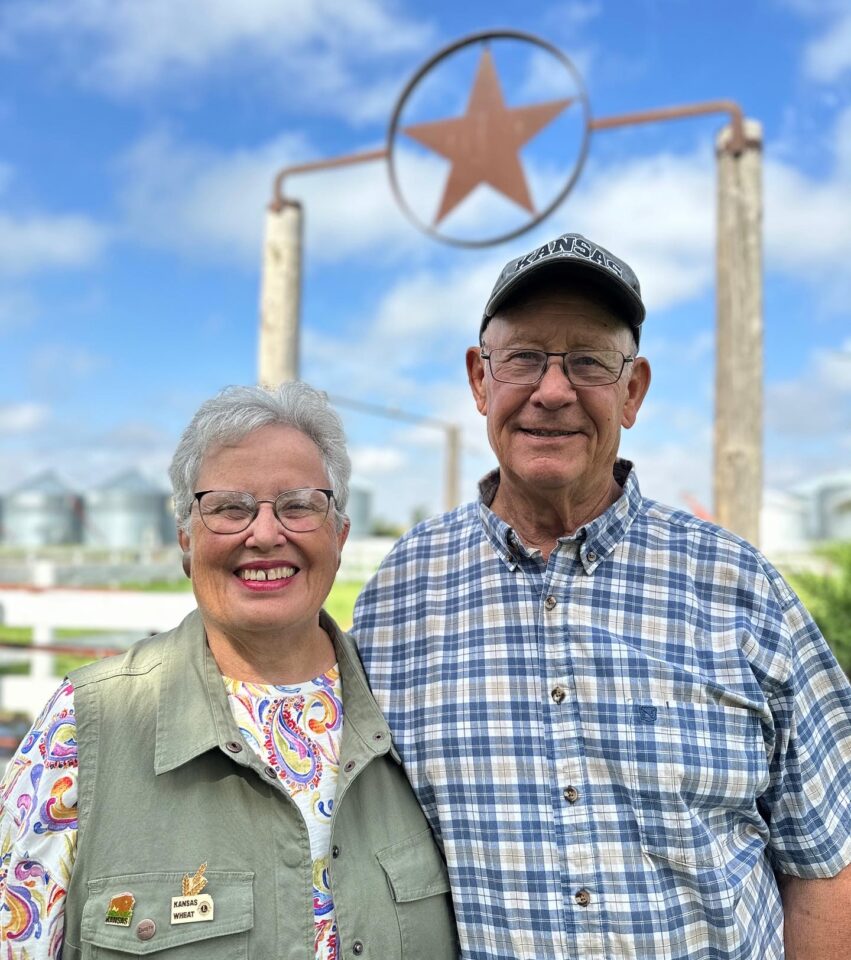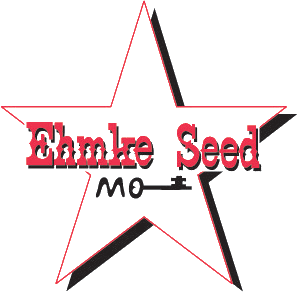
Ehmke Seed of western Lane County was established back in the mid-1980s when Vance and Louise Ehmke couldn’t find a source of seed for the newly released TAM 107 wheat variety. That variety was literally light years ahead in yield of all other commercial varieties at the time. Anxious to incorporate this
new seed technology in their farm operation, the Ehmkes reasoned if they
became certified seed wheat growers themselves, they’d have much quicker
access to new varieties including TAM 107. Thus, Ehmke Seed was born.
From that modest beginning, the seed company now handles 10 wheat varieties
as well as a number of rye and triticale lines. This grain, produced largely
on the Ehmke farm, is now no longer sold just within a few western Kansas
counties. “Instead we ship certified and processed seed into a number of
states from Wyoming to south Texas and from Washington to South Carolina,
New York and Pennsylvania,” Louise explains.
Over the years the Ehmkes have gradually added to what is now a
500,000-bushel grain bin complex with over 50 grain bins to store the many
identity preserved grains. Licensed by a number of land-grant universities
like Kansas State University, Colorado State University and the University
of Nebraska, they also sell seed from private US and European seed
companies. “One of the most enjoyable things that happened as a result of
the seed business was when we were in Warsaw, Poland looking at new
varieties from one of the largest European seed companies…and when we were
signing their guest registry, we noticed that Dr. Norman Borlaug had been
there just before us. Borlaug was winner of the Nobel Peace Prize for his
work that lead to the Green Revolution,” Vance says. “I thought that was
quite cool-walking in the shadow of giants!”
Also as a result of our association with universities and private seed
companies, many of these institutions now have test plots here on our farm.
For instance, Dr. Allan Fritz, KSU wheat breeder, grows out his advanced
breeding materials here while Dr. Mary Guttieri, USDA virologist, also has
plots on the Ehmke farm. Mary’s plots are designed to evaluate materials in
her search for resistance to the dreaded wheat streak mosaic virus. These
plots have grown in importance and now include materials from a number of
other universities as well as private seed companies. Fritz, the wheat
breeder, says these plots are now the central hub for virtually all work
dealing with this virus. And this research work very definitely helps local
producers who have quicker access to these new and improved varieties.
Several governors of Kansas have toured Ehmke Seed and have visited with
these researchers while here on the Ehmke farm.
One of the first seed companies to see the value of alternative small grains
like triticale, over the past 30 years, the Ehmkes developed a line of
triticale and rye varieties that easily stand out in variety trials here in
the central and southern plains. Vance says their ThunderTall and
ThunderTall II varieties of triticale have both won the New Mexico State
University irrigated dairy variety trails several times while also placing
second and third in the Texas A&M irrigated trials that include between 30
and 40 other varieties. Too, they’re in the top yield group in K-State
trials for hay/silage varieties while also winning the top two places in
other KSU grazing trials.
“At about 300,000 acres, Kansas probably leads the nation in triticale
acreage. And this acreage will only continue to grow for a number of reasons
and one of the main ones being what’s happening as a result of declines in
our irrigation water supplies,” Vance notes. He adds that a KSU ag economist
says we presently buy half of our corn from Nebraska-but we should buy it
all from them and use our remaining water supplies on growing forages like
triticale. Triticale takes less water, and you make more money growing it.
Being certified seed growers, over the years the Ehmkes have employed many
local grade and high school kids from surrounding towns to help rogue out
off types in the seed fields and to help with harvest-oftentimes their first
job. Daughter Marit has often headed up the crews and is now renting some of
the Ehmke land devoted to seed production like her older brother Cole and
wife Mariah. “We really depend on these local kids to help us out. But we
also very definitely depend on other local firms and institutions. And right
at the top of that list is Lane Scott Electric. We’ve got a heck of a lot of
electric motors out here and Kalo and Michael have saved our bacon more than
just once! Also county road upkeep is another thing we count on. We’re just
over 2 miles off Highway 96 but the traffic coming here is anything but
ordinary. It is hard core industrial. Instead of a few 5,000-pound cars a
day, each season we have hundreds and hundreds of 18-wheelers coming in
weighing 28,000 pounds and leaving weighing between 80,000 and 90,000
pounds. Those tires just grind sand and gravel to dust,” Vance says.
The Ehmkes both emphasize that Lane County is a great place to do business
and that we have a great environment for seed production. “We’re a little
short on irrigation water but have some of the best soils in the world for
farming. Here we also have easy access to many of our production needs and
service providers. We’d also be sunk were it not for key employee Earl
Steffens who heads up our scant work force of Jaime De la Rocha and Travis
Montgomery,” Vance says. “We’re able to get along with a minimal work force
by relying heavily on local, area and out-of-state custom providers. There’s
just not enough hours in the day to do all this work by yourself.
